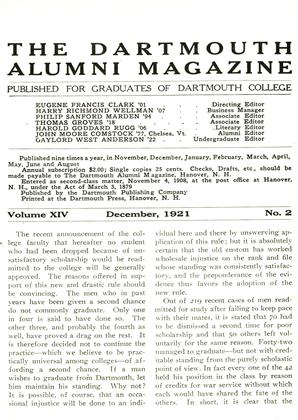One of the most interesting occurrences of the past month in undergraduate affairs was the attitude taken by the College upon the first announcement of the proposed railroad strike. At that time Dartmouth was one of the first of many colleges in which the undergraduate body immediately volunteered for strike duty and the editorial of The Dartmouth of October 19 is significant in its indication of the student sentiment in regard to the situation. Under the heading "Let Them Strike" TheDartmouth said:
"Dartmouth College undergraduates have no quarrel with unionism. We believe in the principle of collective bargaining and in fact, in many of the principles for which unionism stands. But when one group, or a collection of groups of individuals has the bare faced effrontery to say that it or they, will stop normal business, will leave innocent women and children to starve and freeze unless the wishes of the organization are carried out, we maintain that it is high time to call a halt. It is no time to temporize, to play politics or to do anything, in fact, except meet the issue fairly and defeat it.
"It is indeed a time when the President of the United States himself, can read his answer clear if he will but consider the way Calvin Coolidge handled the police strike in Boston. Governor Coolidge said, 'Law and order shall prevail.' They did! Surely, if it was outrageous and unthinkable for the policemen to shirk their duty to the public—to leave Boston unguarded and open to every element of lawlessness, it is even more dastardly deliberateb' to plan such a course of action as will bring sickness and suffering to thousands of helpless and unoffending persons!
"Foreseeing the conditions that must ensue if these strike orders are carried out, the Dartmouth undergraduate body stands ready to don overalls, wield pick and shovel if necessary, to do their small part in seeing to it that the necessities of life are carried to those who are unable in a crisis of this kind, to help themselves."
• Perhaps the most interesting of many editorial comments on the stand taken by TheDartmouth is that of the Manchester (N. H.) Union which is reprinted here.
"COLLEGE RADICALISM"
(From the Manchester Union)
This incident at Dartmouth, in which the undergraduates volunteer for strike service, may be commended to the attention of the worried souls who have feared, and said that our colleges were becoming hotbeds of radicalism. There has been a good deal of this talk, and much of it has been directed towards Dartmouth, for the Hanover group has been out in the front of the movement looking to better industrial relations, a reflection of this being found in the undergraduate statement regarding collective bargaining. But most of the influential colleges have had their share of criticism, most of them have been held up as dangerous to social stability because of their alleged pernicious teaching. Within a very few months no less a person and personage than the vice-president has advocated putting the lid upon this so-called radicalism in the colleges.
Nor will the incident be singular. The Dartmouth undergraduates lay no claim to distinction. They assume a call for the services of all college, men, assume swift and united response, and simply anticipate the invitation with an acceptance. Their implied forecast is accurate. The American college world would get out of white collars and into overalls at the drop of the hat, in case of a strike against the public safety.
If the fruits of radicalism as taught in the American colleges be volunteering for the service of society, in the event of a transportation strike, commend us to college radicalism.
 View Full Issue
View Full Issue
More From This Issue
-
 Article
ArticleALUMNI COUNCIL MEETS
December 1921 By EUGENE F. CLARK -
 Article
ArticleTHE BURYING GROUND
December 1921 By EDWIN JULIUS BARTLETT '72 -
 Article
ArticleTHE FRESHMAN CLASS
December 1921 By E. GOKDON BILL -
 Article
ArticleThe recent announcement of the college faculty that hereafter no student
December 1921 -
 Article
ArticleNEW FACULTY REGULATIONS
December 1921 -
 Sports
SportsFOOTBALL
December 1921








